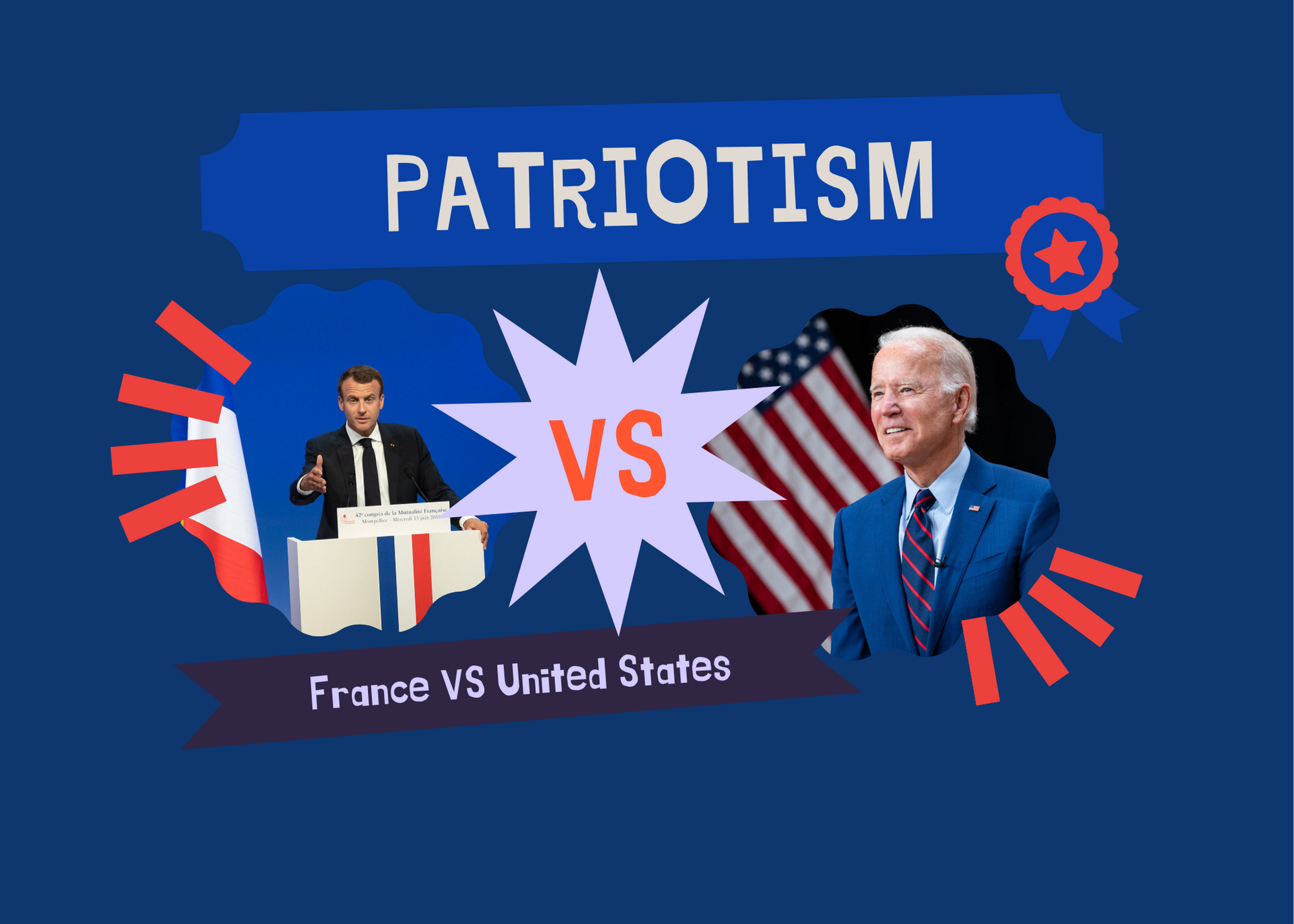The United States of America is a country known around the world for having a patriotic citizenry in comparison to others. In France, the notion of being “proud” of one’s country is perceived differently than in the United States. The American brand of patriotism is foreign to many people in France. While Americans express their patriotism in symbols and words, like flying American flags in front of their homes or saying the Pledge of Allegiance, in France, there are generally no flags in front of houses (perhaps the only person who has a flag in front of his house is the president, Emmanuel Macron, at his official residence, the Élysée, in Paris), and students don’t pledge allegiance to the French flag at school.
Patriotism in America
For many people in the United States, sports are an important part of life; in high school, a lot of students participate in sports, and for some, it’s what makes them proud of their country.
“Something that I’m most proud of in the United States is basketball,” senior Caroline Allen said.
For others, the arts are also an important source of patriotic pride.
“I’m most proud of our arts like dance and music,” senior Hannah O’Neill said. For senior Caroline Murrell, American patriotism is about recognizing the strides the U.S. has made in equality and opportunity.
“I’m most proud of the opportunities, the freedom, and the inclusivity that we have in the United States, and how far we’ve come,” Murrell said. “I definitely do think there are still issues, and we’re experiencing setbacks. It’s not perfect, but I’m proud of the progress that we’ve made, [and] there is still more to go.”
Northwood Principal Dr. Bradford Walston agrees that the freedoms and opportunities Americans have make the nation special.
“What makes me proud to be an American is having the opportunity to do an interview for a school-based newspaper–that is not even an option in some other countries,” Walston said. “[…] I also think that our country has learned a lot from its mistakes and has grown from its mistakes, and there are some mistakes that we continue to make…So I think that there are a lot of things in our country’s history that I’m very quite proud of, and there are a lot of things that I wish that we will learn from and not repeat some of the same mistakes or missteps. ”
English as a Second Language Teacher Chris Atkins has a unique perspective on the U.S. as someone who has lived in the U.S. since 2002, but is a citizen of the United Kingdom.
“The thing I’m most proud of [about the U.S.] is [that] Americans are very slow to judge people…not necessarily on where they come from, but what sort of background they have,” Atkins said. “I think that they are very good at judging people for what they do–their actual actions…[On the other hand], I think the United States is parochial. It doesn’t look beyond itself, doesn’t see its connections to the world. Many Americans don’t really travel, so they don ‘t really have an idea of what countries outside of the USA are like. I don’t like the fact that they think that they are the world’s greatest country when, in fact, every country I’ve ever visited thinks they are the world’s greatest country–they’re all the same. I [also] think America’s claims to freedom are sometimes a little bit weak. It’s not very free in terms of how people can vote and who can vote. It limits that sort of thing, even though it claims to be the world’s biggest and greatest democracy.”
An American’s political opinions can be a reason to have pride in their country, but they can also be a reason for a lack of patriotism.
“I’m less proud of the election process and the school system [in the U.S.],” senior Hannah O’Neill said.
Social Studies Teacher Skip Thibault, who teaches civics at Northwood, explains that he is not proud of certain inequalities that exist in the United States, but that he supports the fact that the United States is a country which has extensive knowledge in medicine and scientific research.
“What I’m most proud of is probably scientific achievement…and least proud of, I think it’s probably a tie between racism and homelessness,” Thibault said.
Patriotism in France
In France, the word “pride” (fierté) is perceived differently than in the United States. Overall, people’s national identity is generally less important. (Note: the following quotes from French sources have been translated into English).
As Romane Denieul, an 18-year-old medical student, explained, “I am not proud to be French. I think the most accurate term would be that I am happy to be French, that I am lucky to live in France, to have so many rights, but I think the notion of pride is not appropriate… the notion of pride for me would only be applied to something that I would have accomplished.”
Dominique Denieul, mayor of Piré Chancé in the Brittany region, agrees that France is a country with many values, rights and cultural wealth that should not be taken for granted.
“I love France because it is a country that has a cultural richness, a diversity of origin with each region, but all with a remarkable heritage and history,” said Denieul. “France has been able to highlight its gastronomie (cuisine) which is now recognized throughout the world…I am proud to live in a country…where democracy has an important place. France has [also] been able to create a health system accessible to all, almost free. What I don’t like seeing is that there are fewer and fewer people participating in all the elections, except those with extreme views. This solely pushes politicians with similarly extreme views into power. I think that young French people in particular forget the history of their country a little quickly and do not realize how lucky they are to live in a democratic and free country.”
Northwood French Teacher Sharon Kolman lived in France for one year in 1976.
“What I love about France is that they have so much pride in their agriculture…Each region has a particular cuisine and products,” Kolman said. “[…] I [also] love that it’s more socialist because I believe that everyone has the right to have medicine, drugs, and visits to the doctor. I also love that there are five weeks off for everyone, the working hours are 35 hours instead of 40 hours or more [and] there is an emphasis on life outside of work. What I found when I lived there is that a lot of people have a firm/fixed opinion; they are not open to other ideas…Also the language, and how we use it: they tend to argue… [and] focus on the negative instead of the positive, so that’s interesting. It’s not necessarily so bad but it’s interesting.”
The Importance of Political Knowledge
It can be difficult for people to have specific opinions about their country if they are not directly involved in national politics. Many of the French people interviewed for this story say that politics are difficult to understand, and that politicians and the media that cover them are corrupt and childish.
Jeanne Lehurt of Brittany says that “no matter what [someone] believes, [they] will always be disappointed” in decisions politicians make.
Adèle Rivé, a high school student, also from Brittany, says that politicians “always use terms that [she doesn’t] understand.”
Marie Monique Didier of Valence in the South of France says that politicians often say things that are “more idiotic than even they are themselves.”
Back in The United States, 50 Northwood students were asked if they were interested in the politics of their country; 35 students said yes and 14 said no.
When senior Tessa Barni was asked why she thinks high school students may be interested or uninterested in politics, she said, “I think that students are interested in politics because it’s such a big part of our daily lives. Even if you’re not really interested, it really plays a big part in everything you do. Everyone has their own opinions, and I know not everyone likes to talk about politics, but policies and the decisions of politicians impact our daily lives…It’s not really everyone’s favorite subject, but you kind of have to talk about it, even if you don’t want to.”
Nationalism Versus Patriotism
For American History Teacher David Orphal, to be patriotic is to have “love for [one’s] country” even if we know it’s not perfect. Orphal considers patriotism and nationalism to be distinct from one another.
“We’re a nation in progress,” Orphal said. “We’ve got a plan on how we want the country to be, and then we’re progressing toward it…I think when people’s loyalty to their country is blind, [it’s] like my country is right or wrong. I love my country no matter what, no matter what it does– that is when patriotism becomes nationalism. And I think nationalism is very dangerous.”
“’Liberty, Equality, Fraternity’ is the motto of France,” said Dominique Denieul. “We value our freedom, freedom of expression. Equality is the social side–access to care, solidarity with each other–and fraternity is living together regardless of origin. It’s tolerance, debate, accepting the ideas of others even if you don’t agree. When you are patriots, you defend your country and what it represents; you defend our values.”
Despite the fact that “pride” is perceived differently in each country, the definition of patriotism that both groups seem to accept is that patriotism is about loving your country through honoring its values, debating issues with others in a respectful way, and fighting for people’s right to freedom and equality. Orphal, Denieul and others believe that patriotism is a happy medium between a person who thinks that his country is perfect and does not make mistakes, and a person who does not care about their country at all. As Charles de Gaulle (former President of the French Republic) said, “Patriotism is to love one’s country. Nationalism is hating that of others.”



